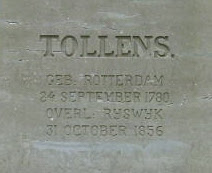There is a large statue of Hendrik Tollens in Het Park.
I had never heard of him before so I had to look him up. He was a famous Dutch poet who wrote the new Dutch National Anthem at the beginning of the 19th century. A new anthem was needed, apparently, because people thought that the old one, the battle hymn of William the Silent, was too Calvinist and too north-centric. Tollens' new anthem, however, wasn't without its detractors. The first line of the song, "Those in whom pure Dutch blood flows, free from foreign taint" brought charges of racism and, in the face of growing racial purity rhetoric in Germany, the Dutch got a new national anthem in the 1930s. (In fact, when I was looking up a link for the music for Tollens' anthem, the list of "other things you might also like" included the Nazi German Anthem.) An interesting point is that when the Dutch abandoned Tollen's anthem for the new one, they simply went back to the original anthem that they hadn't liked before. Either they decided that Calvinism was okay or nobody knew enough to care anymore. This means that the Dutch national anthem is the oldest anthem currently in use.
You can hear Tollen's anthem "Wien Nederlands Bloed" or "Those of Dutch Blood" here:
http://www.youtube.com/watch?v=dq6YlDcTNFs&feature=related
You can here the current (and older) anthem "Het Wilhelmus" right here:
http://www.youtube.com/watch?v=5L_PjoOtuEs&feature=related
"Het Wilhelmus" makes reference to very specific historical events that aren't really "anthemic" much in the same way as our own national anthem is a description of a specific historical battle rather than a panegyric on the greatness of the nation. The Dutch anthem refers especially to all kinds of things that were important to the Dutch of the 16th century--Was William the Silent a native, and therefore more legitimate, ruler? (Thus, "of Duitsen" (German) blood is generally considered to be spelling anomaly and that Tollens really was saying William was of "Dutch" blood.) Did the Dutch have a right to rebel against a legitimately ordinated king? (So the song references William's David-like restraint in the face of the Saul-like Phillip II.) Did they have Divine approval for rebellion? (So the song references William's prayers and reliance on God's guidance.) Since the political questions of the time were pretty complex, it should come as no surprise that there are 15 stanzas in this song. As far as I know, no one sings them all. The You Tube version I linked to just has verses 1 and 6:
V. 1--William of Nassau
am I, of Dutch blood.
Loyal to the fatherland
I will remain until I die.
A prince of Orange
am I, free and fearless.
The king of Spain
I have always honored.
V.6--My shield and reliance
are you, O God, my Lord.
It is you on whom I will rely,
never leave me again.
Grant that I may remain brave,
your servant for always,
and may defeat tyranny,
which pierces my heart.
If you want to see the whole song, with a couple of translations in English, you can go to this site where someone has put all of the lyrics on Wikipedia:
http://en.wikipedia.org/wiki/Wilhelmus
The monument reads:
Tollens
Born Rotterdam
24 September 1780
Died Rijswijk
31 October 1856
(As points of interest, in Dutch, while you can say someone died, you usually say that they have "overleden"--that is to say, "departed"--instead.
(Also, although the monument looks like it says "Ryswyk" there is actually no "y" in the Dutch language (except for imported words) but it is quite common to write the "ij" diphthong as a "y" because it is easier. Also, it sounds quite similar.)


Annoying.
ReplyDeleteWhoops. All fixed. Sorry about that little text formatting error. And Walter, I choose to believe that that is what you found annoying. Not my hard and dedicated efforts to inform and amuse.
ReplyDeleteNo. I said I would post "annoying" comments on your blog. And that's what I did.
ReplyDelete